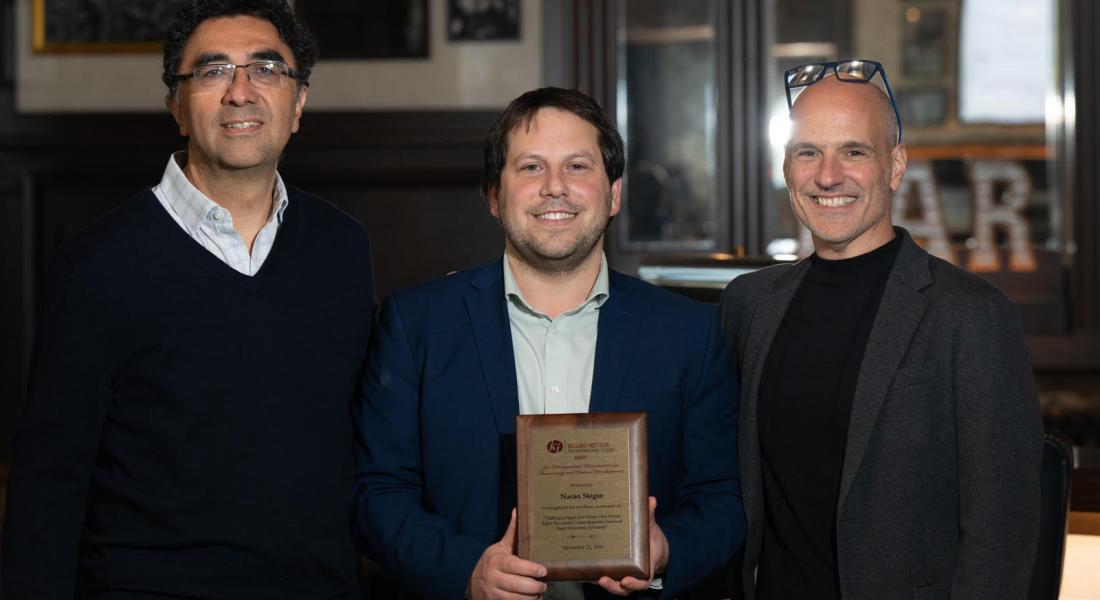
On Friday, Nov. 22, former Kellogg PhD Fellow Natán Skigin was awarded the 2024 Kellogg Institute Award for Distinguished Dissertation on Democracy and Human Development for his dissertation “Challenging Stigma from Below: How Human Rights Movements Contest Repressive States and Shape Democratic Citizenship.” The annual prize recognizes excellence in research consistent with the mission and research themes of the Institute and includes a plaque and a $1,000 monetary gift.
Skigin’s dissertation is a study of the political psychology of solidarity with victims of human rights atrocities in the context of Mexico’s drug wars. It combines experiments in nationally representative surveys with interviews and focus groups with ordinary citizens, journalists, human rights defenders, and victims’ groups. The dissertation shows that when states stigmatize victims of human rights abuses as “criminals,” few people in society are willing to mobilize for them in search for truth and justice. Yet, when victims’ family members – particularly mothers – speak directly to society, their emotional appeals go a long way in undermining state-promoted stigmas and in fostering solidarity. This solidarity can take two forms: anger and indignation that can give rise either to public demands for truth and justice through democratic means or to demands for anti-democratic iron-fist punitive policies.
Characterizing the research as “theoretically sophisticated and empirically creative and rigorous,” Kellogg faculty fellow Guillermo Trejo, one of Skigin’s two advisors, said his dissertation findings “will have incredibly important implications for the study of solidarity with victims in contexts of large-scale criminal violence and criminal wars in fragile democracies.”
“It is a project that will also help Mexico’s human rights community to create the type of public campaigns that will foster proto-democratic solidarity with over 115,000 victims of disappearance,” continued Trejo, a professor of political science. “It is a study that brilliantly exemplifies how best practices in social science research can serve the needs of some of the most oppressed members of society.”
“Although Natán’s randomized control trials take place in Mexico, his theoretical agenda is relevant and urgent across a broad range of settings – including local contexts of police brutality in the United States,” said Skigin’s other advisor, Keough School faculty member Aníbal Pérez-Liñán, who is professor of political science and global affairs and director of the Kellogg Institute. “He wants to establish how attitudes of solidarity emerge, and whether empathy ultimately translates into willingness to exercise agency (e.g., donate time and money) to help victims of human rights violations.”
“Natán is the best doctoral student that I have encountered in more than two decades,” stated Pérez-Liñán.
Skigin has had two papers published in Legislative Studies Quarterly (LSQ), one of the most prestigious journals for the study of legislative politics. Another co-authored paper on political parties and criminal violence in Brazil, published in Research & Politics (2023), inspired one of Amanda Taub’s “Interpreter” columns at The New York Times. He also has solo-authored papers published in Party Politics and Political Psychology.
As a PhD student, Skigin received a Doctoral Dissertation Research Improvement Grant from the National Science Foundation (NSF) and the American Political Science Association, and he garnered research grants from the Evidence in Governance and Politics (EGAP) network and from the Innovations for Poverty Action (IPA) Peace & Recovery Program. At Notre Dame he was a recipient of the Shaheen Award in the Social Sciences. In addition to his Kellogg Phd Fellowship, the Institute funded five grants to Skigin for both research and professionalization opportunities. Last summer, he won an Emerging Scholar Award from the Harry Frank Guggenheim Foundation, received a Peace Scholar Fellowship from the US Institute of Peace (USIP), and was chosen as a Distinguished Junior Scholar by the American Political Science Association (APSA) Political Psychology Section.
“Natán’s work is attracting much attention because it combines urgent normative questions, sophisticated methodological tools, and relevance for human rights,” said Pérez-Liñán, noting especially Skigin’s talent, technical skills, creativity, and work ethic.
Other members of Skigin’s dissertation committee were Kellogg faculty fellows Abby Córdova, professor of global affairs in the Keough School, and Luis Schiumerini, assistant professor of political science, as well as Kevin Arceneaux, professor of political science and director of the Center for Political Research at Sciences Po Paris.
Skigin recently finished a short book manuscript on “Dangerous Stereotypes: Anti-Immigrant Sentiment and Integration Policy Preferences in Latin America,” coauthored with Córdova, which is under contract with Cambridge University Press with publication expected later this year.
The Kellogg Institute additionally honored Skigin with the 2024 Kellogg Institute Award for Outstanding Doctoral Student Contributions, presented in the spring.
Currently he is a postdoctoral fellow at Harvard University's Weatherhead Center for International Affairs. Starting in fall 2025, he will be assistant professor in the Department of International Affairs at the University of Georgia.
The Kellogg Institute for International Studies, part of the Keough School of Global Affairs at the University of Notre Dame, is an interdisciplinary community of scholars and students from across the University and around the globe that promotes research, provides educational opportunities, and builds partnerships throughout the world on the themes of global democracy and integral human development.





